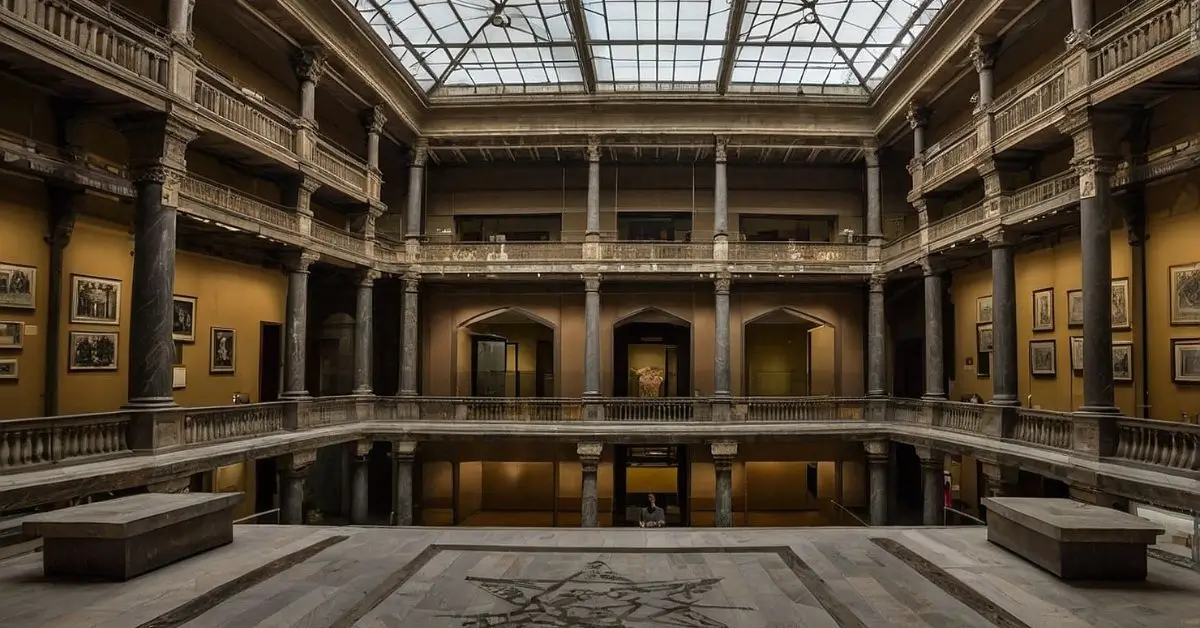The Museo Ebraico di Torino, or the Jewish Museum of Turin, represents a vibrant intersection of Jewish history, culture, and heritage with the city of Turin, Italy. It is a significant cultural and educational institution that sheds light on the history of Jewish presence in Turin and broader Italy, while also serving as a reminder of the rich and complex relationship between Judaism and Italian society. Through its exhibitions, research, and educational programs, the museum preserves Jewish cultural memory and raises awareness of the challenges faced by Jewish communities across history.
Historical Context of Jewish Life in Turin
Early Jewish Presence in Italy
To understand the importance of the Museo Ebraico di Torino, it is crucial to delve into the broader history of Jews in Italy. Jewish communities in Italy date back over two millennia, with the first documented Jewish presence in Rome around the second century BCE. By the Middle Ages, Jewish communities had established themselves across the Italian peninsula, including in regions like Lombardy, Tuscany, and Piedmont, where Turin is located.
The Jewish community in Turin, like others in Italy, was subject to shifting political and religious climates. During the Renaissance, Italian Jews faced both persecution and moments of relative tolerance. This pattern continued into the early modern period. The Italian unification in the 19th century and the emergence of the Italian Kingdom brought new civil rights to Jews, although antisemitism remained present in various forms.
Jewish Community in Turin: From the Ghetto to Integration
The history of the Jewish community in Turin mirrors the complex relationship between Jews and Italian society. Jews were forced to live in ghettos, notably the Turin Ghetto, which was established in 1679 and lasted until 1848, when King Charles Albert of Sardinia issued the Statuto Albertino. This decree granted Jews emancipation, and they were finally able to leave the ghetto and participate more fully in the city’s civic life.
Turin’s Jewish community flourished post-emancipation, becoming actively involved in the city’s economic, social, and cultural spheres. Prominent Jewish families contributed significantly to Turin’s development, particularly during the industrialization period.
The legacy of the ghetto and the subsequent emancipation left a profound mark on the Jewish identity in Turin. The Museo Ebraico di Torino captures this legacy by showcasing how Jewish life in Turin evolved from marginalization to integration, and the significant roles Jews played in the city’s cultural and intellectual development.
The Founding of the Museo Ebraico di Torino
Purpose and Mission
The Museo Ebraico di Torino was established not only to preserve the Jewish heritage of Turin but also to promote understanding of the broader Jewish experience in Italy and across Europe. It was founded in 2017 as part of a wider effort to reclaim and preserve the history of Jewish communities that had been impacted by centuries of discrimination, culminating in the Holocaust.
The museum is located within the Mole Antonelliana, a historically significant building that also houses the National Cinema Museum. The choice of location was symbolically powerful, given Turin’s cultural and historical importance as a city of intellectualism, resistance, and creativity. The Museo Ebraico di Torino positions itself as an educational institution, providing both Jews and non-Jews with opportunities to learn about Jewish culture, religion, and history.
Architectural and Artistic Design
The Museo Ebraico di Torino is notable for its thoughtful architectural and artistic design, which reflects both the solemnity of Jewish history and the vibrancy of Jewish life. The museum’s interior blends traditional Jewish symbols with modern aesthetics. Visitors are greeted with a series of exhibits that invite them to reflect on the Jewish experience from multiple perspectives: religious, historical, cultural, and philosophical.
The architecture emphasizes openness and dialogue, promoting the idea of shared history and mutual understanding between Jews and non-Jews. The layout of the museum takes visitors on a journey through Jewish life, starting with early Jewish presence in Italy, moving through the medieval and Renaissance periods, and culminating in the contemporary era.
Permanent and Temporary Exhibitions
Permanent Exhibitions
The core of the Museo Ebraico di Torino’s collection is its permanent exhibition, which offers a comprehensive overview of Jewish life in Turin and the broader Piedmont region. This exhibition is divided into several thematic sections, each highlighting different aspects of Jewish culture and history.
- The Jewish Religion and Festivals: This section provides insight into the religious practices of Judaism, including its holidays, rituals, and customs. It showcases religious artifacts such as Torah scrolls, menorahs, and ceremonial garments. The goal is to familiarize visitors with Jewish religious life and its significance within the community.
- Jewish Life in the Ghetto: A key part of the permanent exhibition is dedicated to the history of the Turin Ghetto. It highlights the difficult living conditions, the resilience of the Jewish community, and the cultural and intellectual life that thrived despite the restrictions imposed on the ghetto inhabitants.
- Emancipation and Integration: This section focuses on the post-ghetto period, when Jews in Turin gained civil rights and were able to integrate into broader Italian society. The exhibit highlights the contributions of Jewish individuals to Turin’s cultural and economic development during the 19th and early 20th centuries.
- The Holocaust and Resistance: One of the most poignant parts of the permanent exhibition is its focus on the Holocaust. It honors the memory of the Jews from Turin who were deported to concentration camps and killed during World War II. The exhibit also highlights the role of Jews in the Italian Resistance movement, offering a narrative of resilience in the face of oppression.
- Contemporary Jewish Life: The final section of the permanent exhibition celebrates the vibrancy of Jewish life in contemporary Turin. It highlights the community’s contributions to the city’s cultural and intellectual life, as well as ongoing efforts to preserve Jewish heritage.
Temporary Exhibitions
In addition to its permanent collection, the Museo Ebraico di Torino hosts temporary exhibitions that explore various aspects of Jewish history, art, and culture. These exhibitions often focus on specific themes, such as Jewish artists, Jewish contributions to Italian cinema, or the experience of Jewish women in Italy.
Temporary exhibitions allow the museum to remain dynamic and relevant, engaging with contemporary debates and reflecting on how Jewish identity is shaped by global and local contexts. These exhibitions attract a diverse audience and provide a platform for dialogue on issues such as antisemitism, cultural integration, and identity.
Educational Programs and Cultural Activities
Educational Outreach
The Museo Ebraico di Torino is committed to educational outreach, particularly in promoting Holocaust education and fostering an understanding of Jewish culture and history. The museum offers guided tours, workshops, and educational programs aimed at school groups, university students, and the general public. These programs are designed to foster critical thinking and encourage dialogue about historical and contemporary issues related to Judaism.
One of the museum’s key educational initiatives is its focus on Holocaust remembrance. Through partnerships with schools and educational institutions, the museum works to ensure that the memory of the Holocaust is preserved for future generations. Special programs are organized around Holocaust Memorial Day (January 27), and survivors are invited to share their testimonies.
Cultural and Interfaith Dialogue
The Museo Ebraico di Torino also plays an important role in fostering interfaith dialogue. It regularly organizes cultural events, such as lectures, film screenings, and discussions, which bring together people of different faiths and backgrounds. These events create opportunities for dialogue between Jews, Christians, Muslims, and others, promoting mutual understanding and respect.
The museum’s commitment to cultural and interfaith dialogue reflects the broader role of Jewish museums in Europe, which seek to bridge divides and contribute to the building of more inclusive societies. By hosting cultural events that appeal to diverse audiences, the Museo Ebraico di Torino helps to dismantle stereotypes and foster a greater appreciation of Jewish contributions to Italian and global culture.
Challenges and Future Prospects
Preserving Jewish Memory in a Changing World
Like many Jewish museums across Europe, the Museo Ebraico di Torino faces the challenge of preserving Jewish memory in a rapidly changing world. As the number of Holocaust survivors dwindles and Jewish communities in Italy and elsewhere face new challenges, the museum must find innovative ways to engage younger generations and keep the lessons of Jewish history alive.
One way the museum is addressing this challenge is through the use of digital technology. By digitizing its collections and creating interactive exhibits, the museum is making Jewish history accessible to a wider audience, both in Italy and globally. Virtual tours, online exhibits, and educational videos are among the tools the museum is using to reach new audiences.
Expanding the Museum’s Role
Looking to the future, the Museo Ebraico di Torino aims to expand its role as a center for Jewish studies and cultural exchange. Plans are underway to create a research center within the museum, where scholars can access the museum’s archives and collections for research on Jewish history in Italy and Europe.
Additionally, the museum seeks to strengthen its ties with other Jewish cultural institutions across Europe and beyond. By forming partnerships with other museums, research centers, and universities, the Museo Ebraico di Torino hopes to contribute to a broader understanding of Jewish history and its relevance to contemporary society.
Conclusion
The Museo Ebraico di Torino stands as a testament to the enduring legacy of Jewish life in Turin and Italy. Through its exhibitions, educational programs, and cultural events, the museum preserves the memory of a community that has faced centuries of discrimination but has also contributed significantly to the social, cultural, and intellectual fabric of Turin. As the museum looks to the future, it remains committed to fostering dialogue, preserving Jewish memory, and promoting a deeper understanding of Jewish culture and history.











